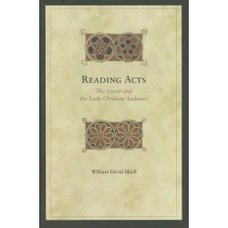Book Recommendations
My top books for the year. Shaye D. Cohen, From the Maccabees to the Mishnah, Second edition. 2006 Eddie Hammett, Making Shifts without Making Waves. Columbia Partnership, 2009. David Bentley Hart, Atheist Delusions: The Christian Revolution and its Fashionable Enemies. New Haven: Yale University Press Michael Horton, Christless Christianity: the Alternative Gospel of the American Church. Baker Books, 2008. Leander E. Keck, A Future for the Historical Jesus: the place of Jesus in Preaching and Theology. Philadelphia: Fortress Press, 1980. -Keck's critique of the 2nd quest for the historical Jesus is still applicable to today's quests. Salt and Light: a Guide to Loving Knoxville. Edited by Andy Rittenhouse and Heidi Unruh. 2009. -This is a new improved version of the Salt and Light Guidebook for ministries. Anyone doing ministry in Knox County needs to see the big picture. This book captures it. Robert Lithicum, Building a People of Power: Equipping Churches to Transform their Community Robert D. Lupton, Renewing the City: Reflections on Community Development and Urban Renewal. Intervarsity Press, 2005. -Lupton operates a faith based community development corporation in Atlanta. This book is a Bible study of Nehemiah with modern application to churches trying to be on mission in the city. William Gilmore Simms, Sabbath Lyrics: A Christmas Gift of Love. Charleston: Walker and James, 1849. -Simms and his wife had 14 children. Five of them survived him. This book is a collection of his poetic paraphrases of the prophecy of Christ's birth in Isaiah intermingled with his reflections on the death of children. Complete version available at Google books. Rebecca Solnit, Paradise Built in Hell: The Extraordinary Communities that Arise in Disaster. Viking Press, 2009. Janet Soskice, The Sisters of Sinai: How to Lady Adventurers Discovered the Hidden Gospels. Knopf Publishers, 2009. Albert L. Winesman, et al. Living Your Strengths: Discover Your God-Given Talents and Inspire Your Community. -This book is the Christian edition of Gallup's "Strengths Finder" approach. Winesman uses spiritual gifts language to discuss strengths. Great for team building and individual reflection.







1 comment:
"Historical Jesus"???
While scholars debate the provenance of the original accounts upon which the earliest extant (4th century, even fragments are post-135 C.E.), Roman gentile, Hellenist-redacted versions were based, there is not one fragment, not even one letter of the NT that derives DIRECTLY from the 1st-century Pharisee Jews who followed the Pharisee Ribi Yehoshua.
Historians like the eminent late Oxford scholar, James Parkes (The Conflict of the Church and the Synagogue) have demonstrated incontestably that 4th-century Roman Christianity was the 180° polar antithesis of 1st-century Judaism of ALL Pharisee Ribis. The earliest (post-135 C.E.) true Christians were viciously antinomian (ANTI-Torah), claiming to supersede and displace Torah, Judaism and ("spiritual) Israel and Jews. In soberest terms, ORIGINAL Christianity was anti-Torah from the start while DSS (viz., 4Q MMT) and ALL other Judaic documentation PROVE that ALL 1st-century Pharisees were PRO-Torah.
There is a mountain of historical Judaic information Christians have refused to deal with, at:
www.netzarim.co.il
Original Christianity = ANTI-Torah. Ribi Yehoshua and his Netzarim, like all other Pharisees, were PRO-Torah. Intractable contradiction.
Building a Roman image from Hellenist hearsay accounts, decades after the death of the 1st-century Pharisee Ribi, and after a forcible ouster, by Hellenist Roman gentiles, of his original Jewish followers (135 C.E., documented by Eusebius), based on writings of a Hellenist Jew excised as an apostate by the original Jewish followers (documented by Eusebius) is circular reasoning through gentile-Roman Hellenist lenses.
What the historical Pharisee Ribi taught is found not in the hearsay accounts of post-135 C.E. Hellenist Romans but, rather, in the Judaic descriptions of Pharisees and Pharisee Ribis of the period... in Dead Sea Scroll 4Q MMT (see Prof. Elisha Qimron), inter alia.
"Historical Jesus" is an intractable oxymoron.
The question is, will you follow the authentic historical Ribi or the post-135 C.E. Roman-redacted antithesis?
Post a Comment